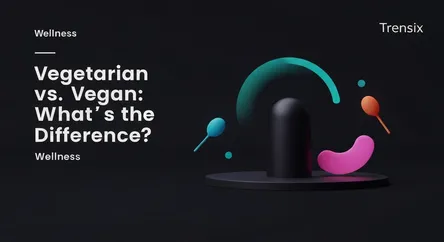Wellness
Vegetarian vs. Vegan: What's the Difference?

Understand the key differences between vegetarian and vegan diets, why they are popular, and how they impact health and lifestyle choices.
What is it?
A vegetarian diet excludes meat, poultry, and seafood. However, there are variations. Lacto-ovo-vegetarians consume dairy products and eggs, lacto-vegetarians consume dairy but not eggs, and ovo-vegetarians eat eggs but not dairy. A vegan diet is the strictest form of vegetarianism. It excludes all animal products, including meat, dairy, eggs, and often honey and gelatin. Veganism frequently extends beyond diet into a lifestyle that avoids any products derived from or tested on animals, such as leather, wool, and certain cosmetics.
Why is it trending?
The popularity of vegetarian and vegan diets is growing for several reasons. Health is a primary motivator, with studies suggesting that plant-based diets can lower the risk of heart disease, type 2 diabetes, and certain cancers. Environmental concerns are another significant driver. Animal agriculture contributes heavily to greenhouse gas emissions, and adopting a plant-based diet is seen as a way to reduce one's carbon footprint. Additionally, many people choose these diets for ethical reasons, stemming from a belief in animal welfare and the right of animals to live free from exploitation for food or other purposes.
How does it affect people?
Adopting a vegetarian or vegan diet can have significant effects on health and lifestyle. Both diets can lead to health benefits like lower cholesterol and blood pressure, but require careful planning to ensure nutritional needs are met. Nutrients like vitamin B12, iron, calcium, and zinc may require special attention through fortified foods or supplements. Lifestyle adjustments are more pronounced for vegans, who often scrutinize food labels, clothing materials, and household products to avoid all animal-derived substances. This conscious consumerism reflects a commitment to a lifestyle free from animal exploitation.